|
Featured picture tools: |
These featured pictures, as scheduled below, appeared as the picture of the day (POTD) on the English Wikipedia's Main Page in July 2004.
You can add an automatically updating POTD template to your user page using {{Pic of the day}} (version with blurb) or {{POTD}} (version without blurb). For instructions on how to make custom POTD layouts, see Wikipedia:Picture of the day.Purge server cache
July 3
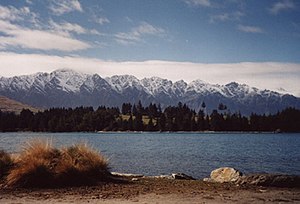
|
The Remarkables and Lake Wakatipu from Queenstown The Remarkables are a 540 acre mountain ski field located south of Queenstown, New Zealand. The other skifields in Queenstown are Cardrona, Coronet Peak, and Treble Cone. Queenstown is a resort town in South Island and is surrounded by the Southern Alps. Photo credit: Tiles
Recently featured:
|
July 6

|
Bozen or Bolzano is a town in the Trentino-South Tyrol region of Italy. It is the capital of the German speaking autonomous province of Bozen-Südtirol or Bolzano-Alto Adige, officially bilingual. The province is almost completely mountainous, and is extended on the Etsch (It. Adige) valley north of the town of Salurn. Photo credit: Roland Wolf
Recently featured:
|
July 7
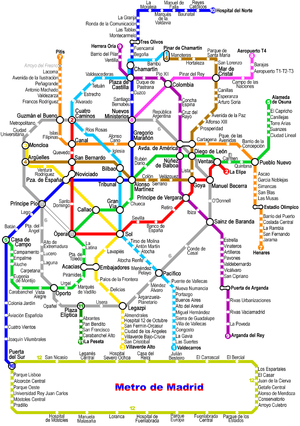
|
The Madrid metro is the large metro system serving Madrid, the capital of Spain. It is one of the largest metro systems in the world, despite Madrid having a population of only four million. The metro opened in 1919 under the direction of the Compañía de Metro Alfonso XIII. Metro stations served as air raid shelters during the Spanish Civil War. Photo credit: Montrealais
Recently featured:
|
July 8
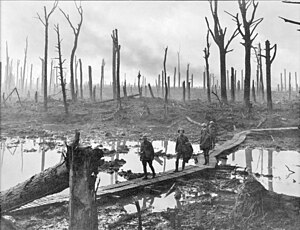
|
Soldiers of an Australian 4th Division field artillery brigade on a duckboard track passing through Chateau Wood, near Hooge in the Ypres salient, October 29, 1917. The photo was taken in the vicinity of the Battle of Passchendaele, also known as the Third Battle of Ypres, which was one of the major battles of World War I. Photo credit: James Francis Hurley
Recently featured:
|
July 9

|
The focus of the Lincoln Memorial is this sculpture of Abraham Lincoln, seated. Daniel Chester French studied many of Mathew Brady's photographs of Lincoln, and depicted the president as worn and pensive, gazing eastwards down the Reflecting Pool at the capital's starkest emblem of the Union, the Washington Monument. One hand is clenched, the other open. Beneath his hands, the Roman fasces, symbols of the authority of the Republic, are sculpted in relief on the seat. Photo credit: Raul654
Recently featured:
|
July 10

|
Brisbane at night Brisbane is the capital city of the state of Queensland, Australia. It is situated in the southeast corner of Queensland and straddles the Brisbane River. The city is named after Sir Thomas Brisbane, a soldier and colonial administrator born in Ayrshire, Scotland. Photo credit: Gary Curtis
Recently featured:
|
July 11

|
A mad scientist is a stock character, often villainous, who appears in fiction as a scientist who is insane or eccentric. He is usually working with some utterly fictional technology in order to forward his evil schemes. Recent mad scientist depictions are often satirical and humorous, and some are actually protagonists, such as Dexter in the cartoon series Dexter's Laboratory. Photo credit: J.J. McCullough
Recently featured:
|
July 12
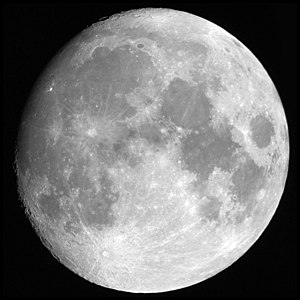
|
The Moon is the only natural satellite of Earth. During the ancient period, it was not uncommon for cultures to believe that the Moon died each night, thus descending into the underworld. As late as the 1920s (or so), it was believed that the Moon might have a breatheable atmosphere. In 1969, Neil Armstrong and Buzz Aldrin became the first humans to land on the Moon. Photo credit: Michael K. Fairbanks
Recently featured:
|
July 13

|
View of Paris from the Notre-Dame showing the River Seine and the Eiffel Tower. The Notre-Dame de Paris is a gothic cathedral on the eastern half of the Île de la Cité in Paris, France. The cathedral is probably best known from Victor Hugo's novel, The Hunchback of Notre Dame, which was first published in 1831. Photo credit: Michael Reeve
Recently featured:
|
July 14

|
|
The painter's algorithm is one of the simplest solutions to the visibility problem in 3D computer graphics. When projecting a 3D scene onto a 2D plane, it is at some point necessary to decide which polygons are visible and which are hidden. The distant mountains are painted first, followed by the closer meadows; finally, the closest objects in this scene - the trees - are painted. For detailed scenes, the painter's algorthm generally proves to be a slow solution. Photo credit: Fredrik
Recently featured:
|
July 15

|
Yellow rattle (Rhinanthus minor) is a flowering plant in the family Scrophulariaceae. This family comprises 220-300 genera and 4000-4500 species. The family has a cosmopolitan distribution, with the majority found in temperate areas, including tropical mountains. Other members of the family include Digitalis, Linaria and Verbascum. Yellow rattle is a semi-parasitic plant that gains some of its nutrients from the roots of neighbouring plants. The name refers to the seedpods, which contain loose, rattling seeds when ripe. Photo credit: sannse
Recently featured:
|
July 16
| File unavailable |
Left section of the ceiling of the Sistine Chapel after restoration. The Sistine Chapel is a religious chapel and one of the most famous artistic treasures of the Vatican, built between 1475 and 1483, in the time of Pope Sixtus IV della Rovere. The chapel is known worldwide both for being the hall in which conclaves and other official ceremonies are held, including some papal coronations, and for having been decorated by Michelangelo. The subjects of the pictures were historical religious themes. Michelangelo was employed to paint only 12 figures, the Apostles, but when the work was finished there were more than 3,000. Photo credit: Adrian Pingstone using a artchive.com source
Recently featured:
|
July 17

|
A compound eye is a visual organ found in certain arthropods. The compound eye consists of between 12 and 1,000 ommatidia, little dark/bright sensors. The image perceived by the arthropod is "recalculated" from the numerous ommatidia which point in slightly different directions. In contrast to other eye types, there is no central lens or retina. Though the resulting image is poor in resolution, it can detect quick movements and, in some cases, the polarization of light. Dragonflies have about 30,000 facets to their compound eyes, giving them nearly a 360° field of vision. Photo credit: David L. Green
Recently featured:
|
July 18

|
|
The Skyline Boulevard in the San Francisco Bay Area stretches through the Santa Cruz Mountains, here near Palo Alto, California. Three large cities dominate the San Francisco Bay Area; San Francisco, San Jose, and Oakland. As well as constituting one of the world's greatest metropolitan areas, the Bay Area includes some exceptional natural coastal and rural landscape. It includes significant national parks such as the Point Reyes National Seashore and a large number of state parks. Photo credit: Jawed Karim
Recently featured:
|
July 19

|
Bryce Canyon National Park is distinctive due to its unique geological structures, called hoodoos. In winter, most birds in the park migrate, but jays, ravens, nuthatches, eagles, and owls stay. The Mule Deer, Mountain Lion, and coyotes will migrate to lower elevations. Ground squirrels and marmots pass the winter in hibernation. Photo credit: National Park Service
Recently featured:
|
July 20

|
Mars, the fourth planet from the Sun, is named after the Roman god of war because of its blood red color. Mars has two small, oddly-shaped moons, Phobos and Deimos, named after the sons of the Greek god Ares. At some point in the future Phobos will be broken up by gravitational forces. Photo credit: NASA
Recently featured:
|
July 21

|
The Water Buffalo is a very large ungulate. It survives in the wild in India, Nepal, Bhutan and Thailand; is very widespread as a domestic animal in Asia, South America. North Africa and Europe; and is feral in northern Australia. Photo credit: Chmouel Boudjnah
Recently featured:
|
July 22
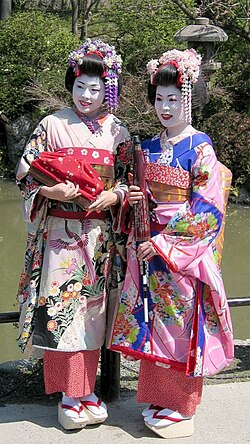
|
Women dressed as geisha in Kyoto, Japan. They are wearing traditional kimonos and geta Geisha (芸者) are traditional Japanese artist-entertainers. Geisha were very common in the 18th and 19th centuries, and are still in existence today, although their numbers are dwindling. The geisha tradition evolved from the taikomochi or hōkan, similar to court jesters. Geisha were traditionally trained from young childhood although modern geisha begin their training, which remains extremely long and difficult, at much older age. Photo credit: Michael Reeve
Recently featured:
|
July 23

|
Zootomical terms of location overlap considerably with terms used in human anatomy. In animals, the head end is called the "cranial end" and the tail end is the "caudal end". The side of the body normally oriented upwards is the "dorsal" side; the opposite side, typically the one closest to the ground when walking on all legs, swimming or flying, is the "ventral" side. Photo credit: Jonathan Merritt
Recently featured:
|
July 24

|
The four-stroke cycle of an internal combustion engine is the cycle most commonly used for automotive and industrial purposes today, including cars, trucks, and generators. The cycle was invented by Nikolaus Otto in 1876, and is also called the Otto cycle. The cycle is characterized by four strokes, or straight movements in a single direction, of the piston. Photo credit: Eric Pierce
Recently featured:
|
July 25
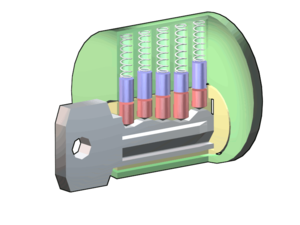
|
The pin tumbler lock is a lock mechanism that utilizes a group of pins of varying lengths to prevent opening the lock without the correct key. Pin tumblers are most commonly employed in cylinder locks, but may also be found in tubular or radial locks. When the correct key is inserted, the gaps between the key pins (red) and driver pins (blue) align with the edge of the plug (yellow). Photo credit: Eric Pierce
Recently featured:
|
July 26
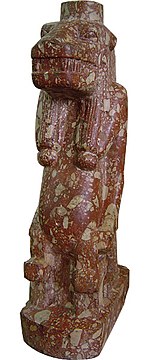
|
Tawaret was a popular deity in ancient Egyptian mythology. She was a household deity who protected women during pregnancy and childbirth, in conjunction with another deity, Bes. Tawaret was depicted as an amalgam of human and animal with the head of a hippopotamus,the arms and legs of a lion, the back and tail of a crocodile, and the breasts and stomach of a pregnant woman. Photo credit: ChrisO
Recently featured:
|
July 27
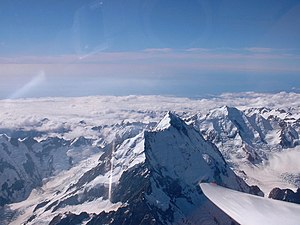
|
Mount Cook, a peak in the Southern Alps is the highest mountain in New Zealand. Mount Cook is also known as Aoraki, meaning "Cloud Piercer" in the Kai Tahu dialect of the Maori language. The mountain is located within the Aoraki/Mount Cook National Park and was formally declared one of the United Nations World Heritage Parks in 1953. Photo credit: User:Dynabee
Recently featured:
|
July 28
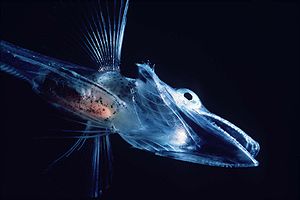
|
Icefish are a type of Antarctic fish belonging to various families, including the Channichthyidae family. They have no haemoglobin and their blood is transparent. They feed on krill, copepods, and other fish. Icefish rely on well-oxygenated water and absorb oxygen directly through the skin as they lack red blood cells. Photo credit: Uwe Kils
Recently featured:
|
July 29

|
Darlingtonia californica, also called the California Pitcher plant or Cobra Lily, is a carnivorous plant in the family Sarraceniaceae. Darlingtonia is native to California and Oregon and grows in bogs and seeps. The name Cobra Lily is from the resemblance of the tubular leaf to a rearing Cobra, complete with "fangs". The genus Darlingtonia is monotypic. Photo credit: Daniel Keshet
Recently featured:
|
July 30

|
Weather lore, the informal folklore related to the prediction of the weather, suggests that the cumulus humilis clouds in this sky indicate a good day ahead. Such clouds show there is very little convection in the lower atmosphere, and the fact that it is well-formed indicates light winds at low levels. There is no cloud aloft, and thus no moisture or stable conditions or both. The cumulus congestus on the horizon suggests showers may be possible three or four hours from now, at the earliest, but chances are good it will remain a pleasant day through until the evening. Photo credit: Denni Windrim
Recently featured:
|
July 31

|
The National Gallery at night, illuminated for an event to promote the launch of a Pepsi commercial. The National Gallery in London is an art gallery designed by William Wilkins. It holds part of the National Collection, particularly Western European art from 1250 to 1900. The collection of 2300 paintings belongs to the British public. Photo credit: Michael Reeve
Recently featured:
|
Picture of the day archives and future dates